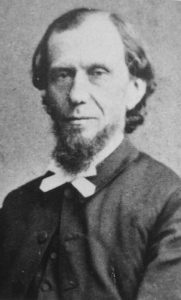Portraits of Revival-Andrew Murray-Part 1
 Andrew Murray (1828-1917) was a great writer, preacher and evangelist. He experienced revivals in Scotland similar to those that took place in America during the Great Awakening (1795-1835) under Charles Grandison Finney but before that he tried to stop a revival in his church in South Africa for which his father had prayed for 60 years. Andrew’s father prayed often for revival to come to his church.
Andrew Murray (1828-1917) was a great writer, preacher and evangelist. He experienced revivals in Scotland similar to those that took place in America during the Great Awakening (1795-1835) under Charles Grandison Finney but before that he tried to stop a revival in his church in South Africa for which his father had prayed for 60 years. Andrew’s father prayed often for revival to come to his church.
Every Friday evening he read to his family accounts of great movements of the Holy Spirit throughout the history of the church. Then he retired to his study to pray, pouring out his heart out in tears, pleading with God for a similar outpouring of the Holy Spirit in South Africa. When revival finally came to his church, Murray resisted it.
Why did he resist this revival, considering the fact that he had a praying father who prayed passionately for revival? Not forgetting that he himself had prayed for revival. When the time came for him to participate, he was held back by his belief that the Holy Spirit moved through the preaching of the Word, and therefore only through the pastor. He felt unworthy. He expressed his personal concern in a letter to one of his friends:
When I look at my people, my face forsakes me. I am forced to flee to the Master to seek a new and more entire surrender to His work. My prayer is for revival, but I am held back by the increasing sense of my own unfitness for the work. I lament the awful pride and self-complacency that have now ruled my heart. Oh, that I may be more and more a minister of the Spirit.
One day Murray was finishing a sermon and one of the church elders came running into the sanctuary to tell him that there was a great commotion in the nearby youth meeting hall. There was a young girl who was standing in the back of the hall during prayer time. This young girl requested if she could share a hymn and pray. Within a short time she was on her knees praying loudly, and soon others in the room joined her in spontaneous song and prayer.
It is reported that Murray followed his friend to find out what was going on. As they nearly reached the room, the sound grew louder and louder. Murray confused by the thunderous noise that he couldn’t identify, opened the door and discovered that all sixty young people were on their knees loudly praying and praising God. They didn’t even notice their pastor when he came in the room. Murray then decided that this behavior was inappropriate, he tried to silence them, but they didn’t hear him. They continued praying and singing late into the night, finally leaving the church to go out into the streets where others joined them.
At the next church meeting, Murray finished preaching his sermon. As he led everyone in prayer, the members of the congregation-young and old-spontaneously and simultaneously knelt and loudly prayed their own prayers. Again he tried to quiet them, walking up and down the aisle, begging his flock to calm down. But this time a stranger in the back of the church interrupted him, telling the preacher that he had just come from America where he had witnessed the very same thing happening.
He told Andrew that he needed to realize that the Spirit of God was at work in his church and that he should do nothing to stop it. At that moment, Andrew Murray underwent a transformation. He realized that in spite of him, the revival he had been praying for had finally arrived and that he was to be its champion instead of its opponent. To help the movement gain a foothold, Murray travelled around the country preaching about this new thing that was happening. Everywhere he went, revival broke out.
As with any true revival of the Holy Spirit, this was a revival of prayer. People would had rarely been in church in their lives would come in prayer meetings daily and sometimes even more than once a day. And where it had been difficult to find people to join the ministry prior to this time, as the revival spread, young men began stepping forward to offer themselves for the preaching of the Word.
Sources:
- Andrew Murray, The Ministry of Intercessory Prayer (Bethany House Publishers 1981, 2003, Edited by Nancy Renich, Originally published in 1897 under the title The Ministry of Intercession)
- Andrew Murray, Absolute Surrender (Moody Press MLM Chicago 1963)
- Andrew Murray, Humility (Reprinted by Bridge-Logos Foundation Orlando Florida 2006)